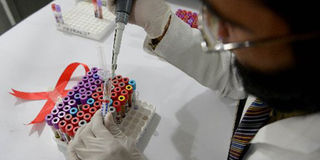South Africa to launch HIV experimental vaccine

Scientists in South Africa have mapped the evolution of an antibody that kills different strains of HIV, which might yield a vaccine for the incurable disease. Clinical trials on an experimental vaccine that could prevent HIV will be launched in South Africa on Wednesday. Photo/AFP
What you need to know:
- The vaccine, known as HVTN 702, will undergo the most advanced clinical trial in South Africa, where more than 1,000 people are infected with HIV daily.
- Seven years ago, a vaccine known as RV144 that was tested in Thailand was found to be about 31 per cent effective.
- Already, 5,400 sexually active men and women aged 18 to 35 who do not have HIV have been enrolled for the trials.
Clinical trials on an experimental vaccine that could prevent HIV will be launched in South Africa on Wednesday.
The vaccine will be tested in a study, the first in seven years to test a vaccine against HIV, the National Institutes of Health, which is funding the study, said on Monday.
A statement says the vaccine, known as HVTN 702, will undergo the largest and most advanced clinical trial in South Africa, where more than 1,000 people are infected with HIV daily.
“If deployed alongside our current armoury of proven HIV prevention tools, a safe and effective vaccine could be the final nail in the coffin for HIV,” Anthony Fauci, director of the US National Institute of Allergy and Infectious Diseases, said in a statement on Sunday.
The vaccine is a modified version of the only one to have shown a positive effect of many that have gone on trials so far.
Seven years ago, a vaccine known as RV144 that was tested in Thailand was found to be about 31 per cent effective after 3.5 years of follow-up.
That trial was, however, controversial as the vaccine was a combination of two where one, called AidsVax, was ineffective on its own.
A NUMBER OF MODIFICATIONS
But researchers in constant search for a vaccine, think they could have better success in South Africa because of a number of modifications.
Already, 5,400 sexually active men and women aged 18 to 35 who do not have HIV have been enrolled for the trials and results are expected in 2020.
The volunteers will get five shots of the vaccine and three boosters — a schedule the researchers will cut down for use in the real world if it is successful. The results will set a precedence for Kenya’s yet to be launched vaccine trials expected in February.
Director of University of Nairobi’s Kenya Aids Vaccine Initiative-Institute of Clinical Research Prof Omu Anzala said if the South African vaccine shows promise, we will learn something from it to improve what we will come up with in future,” he said.
“We have tried at least 14 vaccines and will test a new one next year,” he said.
At least two-thirds of the participants will be women, who are more likely to get infected at the age 18-35 than men.
“The toolbox is in desperate need of something like this. We remain very optimistic,” said Prof Linda-Gail Bekker, of the University of Cape Town and president of the International AIDS Society.





